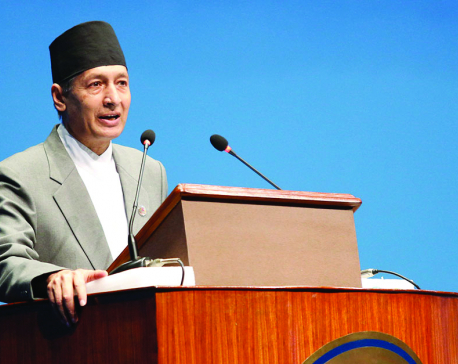
OR

Government should raise public awareness and introduce mental health policies in order to improve psycho-social wellbeing of the citizens
Development of a country is impossible without psycho-socio wellbeing of its citizens. Nepal is a home to around 30 million people. A small-scale epidemiology study conducted in 2013 has shown that 37.5 percent of Nepal’s population suffers from mental disorders, which means around 7,500,000 Nepalis are suffering from different types of mental disorders (two in every five persons). Traditional mindset, stigmas and taboos, lack of proper public awareness and inadequate access to professional help are some of the reasons we are not able to improve the situation.
According to International Association of Suicide Prevention, more than 90 percent of suicides are associated with mental health issues. This shows that mental health and suicides have a direct link. Globally, every year more than 800,000 people (equal to population of Bhutan) commit suicide. Nepal fares worse. According to Nepal Police, 5,436 people have committed suicide in fiscal year 2017/18. The number is higher than deaths by any other factors like road accidents and homicide. Government record shows suicide is the second leading cause of death among youngsters. In Nepal, suicide is the leading cause of death among adult female population.
I interacted with few psychologists and mental health advocates to know more about mental health issues and suicides. They said that people pile up their stress at homes, educational institutes and work place. When they fail to cope with these feelings it leads to different types of mental illness. And youths, as vulnerable beings, are susceptible to multiple stress and ultimately mental disorders.
Mental health in Nepal
Mental health can affect people of any caste, culture, gender, tradition, religion, race, or nationality. In Nepal it is one of the major and common health problems. Mental health can be cured if treated on time. However, due to the traditional mindset people tend to conceal things even if they sense the symptoms of depression.
I recently attended one mental health related event where I realized how deeply mental health is stigmatized in our country. During the event I interacted with some of the psychologists who said even well-educated people tend not to talk about it. I also felt if right efforts are not taken it could result in devastating situations.
Mental health is one of the neglected issues in Nepal. A large number of people are deprived of basic health services which have direct impact on their psychosocial wellbeing. Many patients do not seek for professional help. Even if they do, highly expensive fees make it practically unaffordable for people receive treatment. Similarly, severe mental health patients are caged, abandoned and treated brutally in remote areas. Though different organizations are working to address the issue, their services are limited to urban areas.
Regarding public awareness, neither teachers nor parents seem to understand consequences of mental health nor do they tend to explain the same to the students. Due to lack of adequate knowledge people still believe in superstitions. Similarly, ditching, dumping, abandoning, humiliating, rejecting, teasing are common experiences persons with mental disorders and their family have to face.
Nepal’s mental health policy was formulated in 1996. Later in 2016 the policy was redrafted, but there is no separate mental health legislation yet. Final draft of mental health policy has been prepared and now it is in the Ministry of Health for review.
Lack of proper epidemiological study has added more difficulties to conduct research about mental health situation in the country. The government should raise public awareness and introduce mental health policies in order to improve psycho-social wellbeing of the citizens.
Talk about it
Mental illness is not like other illnesses that come with physical symptoms. With other illness, when people notice any kind of physical problem they rush to the hospitals. With mental illness, it does not work that day. Even if they notice the symptoms, they think it is under their control.
Thus unless the patients start talking about mental health, no one would come to know about it. Even educated people seem to believe talking about mental health will affect one’s personal and professional life. Many even think that there is no cure to mental health. Mental health is just like any other illness. People are hiding their illness for the fear of being negatively judged.
We all experience emotions like anxiety, happiness, sadness fear and frustration. It’s normal to have these emotions but the problem starts when we stop talking about it and stop seeking professional help when we are in problem. Experts help maintain these emotions. But if you don’t share the problem, hide or lie about it might ruin your life.
The author is associated with My City of Republica
You May Like This

Budget’s fake economics
How will Nepal achieve 8.5 percent growth? Likely sources of growth do not point to more than a mediocre performance,... Read More...

Time to intervene
The government has failed to acknowledge the failure of previous commissions, ignored victims’ pressure and their key demands for legal... Read More...

What next for CK Raut?
CK Raut’s party can take up irrigation as main agenda for ending extreme poverty in Madhesh and turning agriculture into... Read More...











Just In
- Nepal at high risk of Chandipura virus
- Japanese envoy calls on Minister Bhattarai, discusses further enhancing exchange through education between Japan and Nepal
- Heavy rainfall likely in Bagmati and Sudurpaschim provinces
- Bangladesh protest leaders taken from hospital by police
- Challenges Confronting the New Coalition
- NRB introduces cautiously flexible measures to address ongoing slowdown in various economic sectors
- Forced Covid-19 cremations: is it too late for redemption?
- NRB to provide collateral-free loans to foreign employment seekers







Leave A Comment